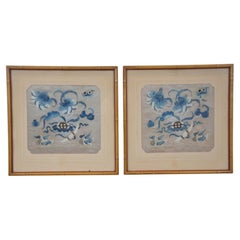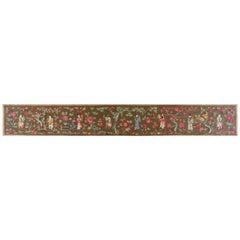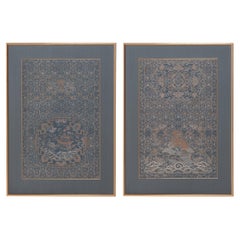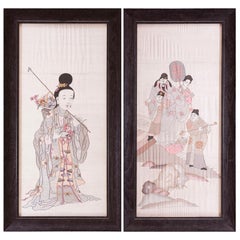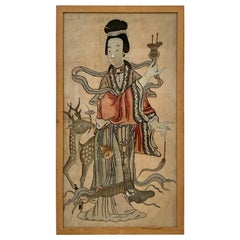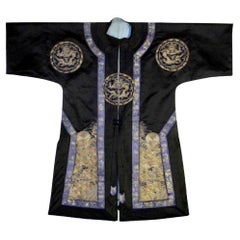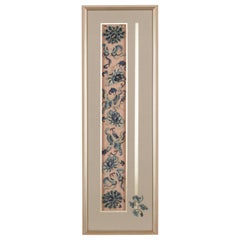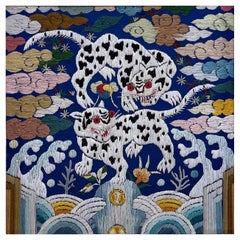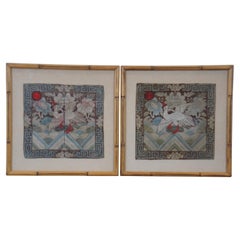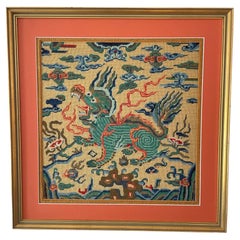Qing Tapestries
The last imperial dynasty from 1644 to 1912 was a time of change in China, beginning with the invasion by Manchurian forces that ended the Ming dynasty and established the Shunzhi Emperor. The expansion of exportation and trade that had bolstered the arts during the Ming era continued, as Qing dynasty furniture involved the same attention to craftsmanship with expert construction techniques in hardwood pieces that were assembled with mortise and tenon joints rather than nails or glue. Together, these eras comprise a golden age of Chinese furniture design.
Ming-style furniture is simple and elegant with clean lines. Chairs of the period and other Ming furniture made an impression on Scandinavian modernist Hans Wegner and his streamlined seating, for example. Whereas Qing-style furniture is elaborate, with an increasing influence from the West leading to lavish carving inspired by the European Baroque and Rococo styles. And while many of the forms that define examples of the latter are common within classical Chinese furniture, such as curving and folding chairs as well as large screens, Qing designs are laden with ornamentation. Frequently, the carved motifs and inlaid designs in mother-of-pearl were auspicious, such as peonies for wealth or dragons for luck. Bats were symbols of happiness in the design of Qing furniture, with one of the characters in the word for bat, bianfu, being a homophone for fu, or “fortune.”
While several types of wood were used in the construction of Qing beds, tables, storage pieces and seating, today’s collectors know that the most prized were the rare rosewoods zitan and huanghuali. They were both sourced from Hainan, China’s largest island, and are marked by a rich luster that occurs naturally, without the application of lacquer or other decorative materials. Many of the most popular woods were imported from southeast Asia, adding to their value. Red sandalwood was also sought after for its durability and connection with Chinese medicine, with some chairs being made for health benefits.
Find a collection of antique Qing tea tables, stools, benches, decorative objects and more furniture on 1stDibs.
Early 20th Century Qing Tapestries
Silk, Faux Bamboo
1890s Chinese Antique Qing Tapestries
Wool
Mid-19th Century Chinese Antique Qing Tapestries
Silk
1890s Chinese Antique Qing Tapestries
Silk
Late 19th Century Chinese Antique Qing Tapestries
Silk, Glass
Late 19th Century Chinese Antique Qing Tapestries
Metallic Thread
Mid-19th Century Chinese Antique Qing Tapestries
Silk
Mid-19th Century Chinese Antique Qing Tapestries
Silk, Wood
Late 19th Century Korean Antique Qing Tapestries
Fabric, Silk, Wood
Late 19th Century Chinese Antique Qing Tapestries
Silk
Early 20th Century Chinese Qing Tapestries
Wool
19th Century Chinese Antique Qing Tapestries
Silk
Early 20th Century Qing Tapestries
Silk
19th Century Chinese Antique Qing Tapestries
Brass
1840s French Antique Qing Tapestries
Wool
Late 19th Century Japanese Antique Qing Tapestries
Cotton
Late 19th Century Japanese Antique Qing Tapestries
Cotton
19th Century Chinese Antique Qing Tapestries
Linen, Silk, Wood
19th Century Chinese Antique Qing Tapestries
Silk, Giltwood
Early 20th Century Qing Tapestries
Silk, Faux Bamboo
20th Century Qing Tapestries
Textile, Wood, Paper
Mid-19th Century Chinese Antique Qing Tapestries
Silk
Mid-19th Century Chinese Antique Qing Tapestries
Natural Fiber, Silk
Late 19th Century Chinese Antique Qing Tapestries
Silk, Cotton
Early 19th Century Chinese Antique Qing Tapestries
Silk
19th Century Chinese Antique Qing Tapestries
Silk
Mid-19th Century Chinese Antique Qing Tapestries
Silk
19th Century Chinese Antique Qing Tapestries
Fabric
